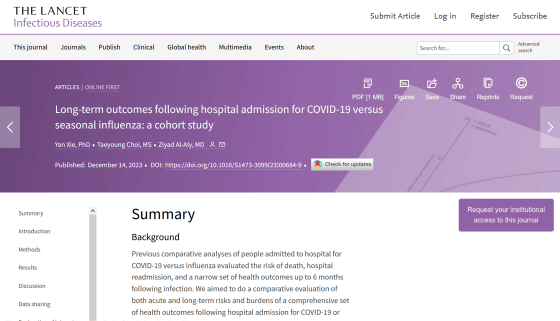The existence of 'long influenza', which increases the risk of death and health damage like long COVID even after recovery, has been revealed

There have been many reports of cases of people suffering from the aftereffects of the new coronavirus infection (COVID-19), called '
Long-term outcomes following hospital admission for COVID-19 versus seasonal influenza: a cohort study - The Lancet Infectious Diseases
https://www.thelancet.com/journals/laninf/article/PIIS1473-3099(23)00684-9/fulltext

'Long flu' has emerged as a consequence similar to long COVID
https://medicalxpress.com/news/2023-12-flu-emerged-consequence-similar-covid.html
'Long flu' is real, and we've likely 'ignored it for a long time' | Live Science
https://www.livescience.com/health/viruses-infections-disease/long-flu-is-real-and-weve-likely-ignored-it-for-a-long-time
Historically, viral illnesses like influenza have been viewed as 'transient', with the prevailing belief that once the main symptoms subside, there are no long-term effects. However, the emergence of long COVID, in which various symptoms continue even after several months have passed since infection with the new coronavirus, has become a major public health threat , and the long-term effects of the viral disease have attracted attention. It's increasing.
To assess the long-term effects of COVID-19 and influenza, a research team from Washington University School of Medicine and the Department of Veterans Affairs St. Louis Healthcare System analyzed data extracted from the Department of Veterans Affairs database.
The data analyzed included 81,280 patients hospitalized with COVID-19 between March 1, 2020 and June 30, 2022, and seasonal cases between October 1, 2015 and February 28, 2019. This included 10,985 patients hospitalized with influenza. Patients were followed for up to 18 months after contracting the virus and compared for risks of death and readmission, 94 health hazards related to organ systems, and burden on organ systems.

The analysis found that patients hospitalized with COVID-19 or seasonal influenza were at increased risk of death, readmission, and health problems 18 months after infection. These risks were highest within the first 30 days of infection for either disease.
'This study shows the high toll of post-hospitalization deaths and health damage from COVID-19 or seasonal influenza,' said Ziyad Al-Aly, M.D., Ph.D., a clinical epidemiologist at the University of Washington and co-author of the study. It is important to note that health risks are highest within 30 days of infection. Many people think that they are cured of COVID-19 or the flu once they leave the hospital. Our research shows that both viruses can cause long-term disease.'
The study found that both illnesses had long-term effects after infection, but overall COVID-19 was found to be more risky than seasonal influenza. Specifically, COVID-19 patients had 8 to 9 more deaths per 100 people during the follow-up period, 20 more people were readmitted to the hospital, and about 8 more people were admitted to the ICU.
In addition, COVID-19 was associated with an increased risk of 64 of the 94 health hazards surveyed, causing damage to the cardiovascular system, nervous system, gastrointestinal system, etc., while influenza It was associated with only six risks: heart disease, tachycardia, type 1 diabetes, cough, low blood oxygen levels, and shortness of breath. Three of the risks posed by influenza are related to the respiratory system, and in fact, influenza had a higher risk to the respiratory system than COVID-19 throughout the follow-up period.
Al-Aly said: 'The only notable exception is that influenza poses a higher risk to the respiratory system than COVID-19. This shows that it is truly a respiratory virus. By comparison, COVID-19 is more aggressive and indiscriminate, and can attack not only the respiratory system but all other organ systems, including the heart and other organs. 'It is likely to cause fatal or severe symptoms in the brain, kidneys, and other organs.'

Al-Aly said: 'Our novel approach compared the long-term health effects of a vast array of symptoms. Five years ago, we would have never thought of investigating the possibility of a 'long flu.' The big lesson we learned from COVID-19 is that infections that were initially thought to only cause short-term illness can also cause chronic disease. “Before the pandemic, we tended to dismiss most viral infections as trivial, claiming that they would get better within a few days. Some people end up having serious health problems. We need to wake up to this reality, stop neglecting viral infections, and understand that viral infections are a major contributor to chronic disease. It is necessary,” he insisted.
Related Posts:
in Science, Posted by log1h_ik







